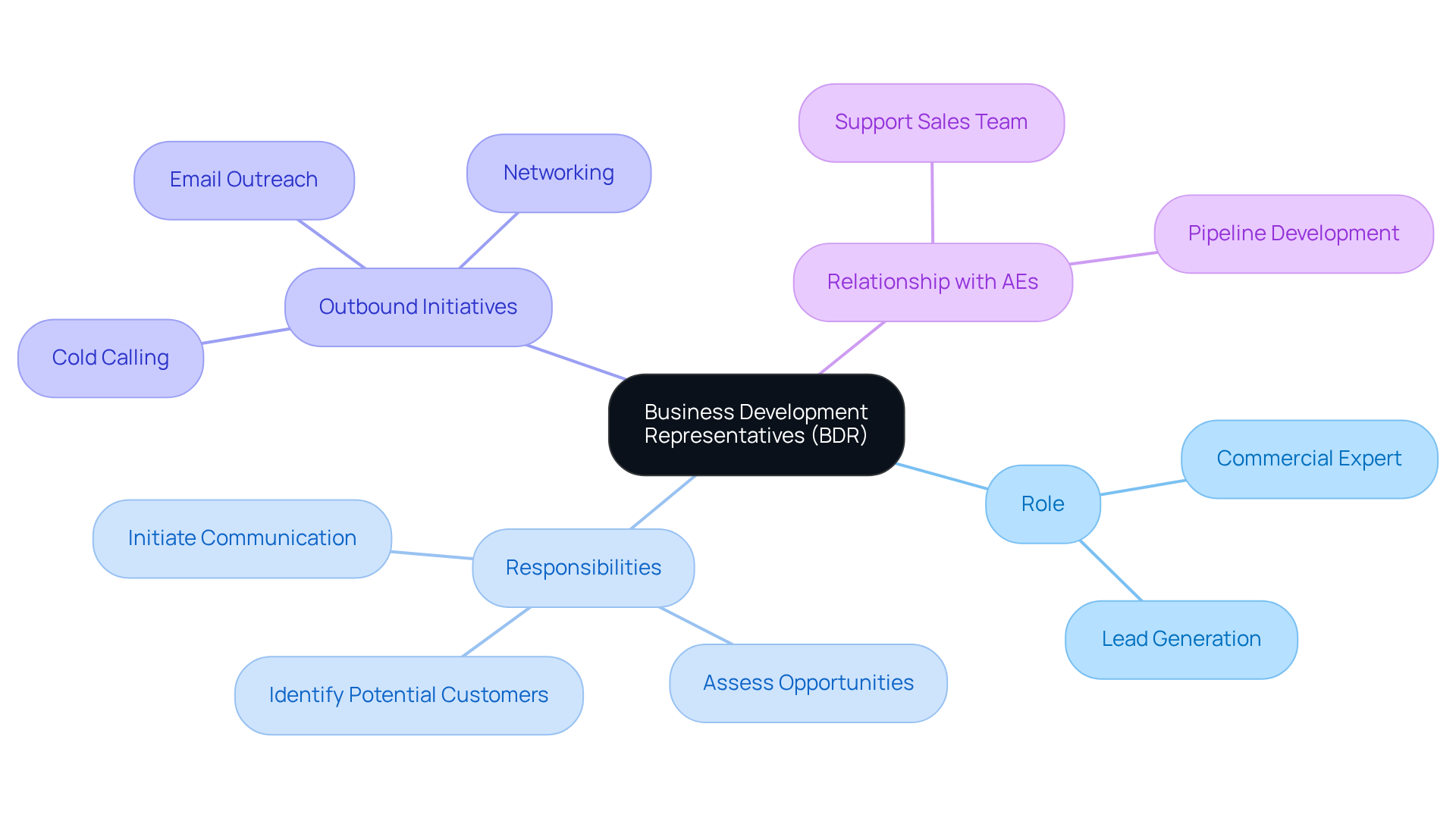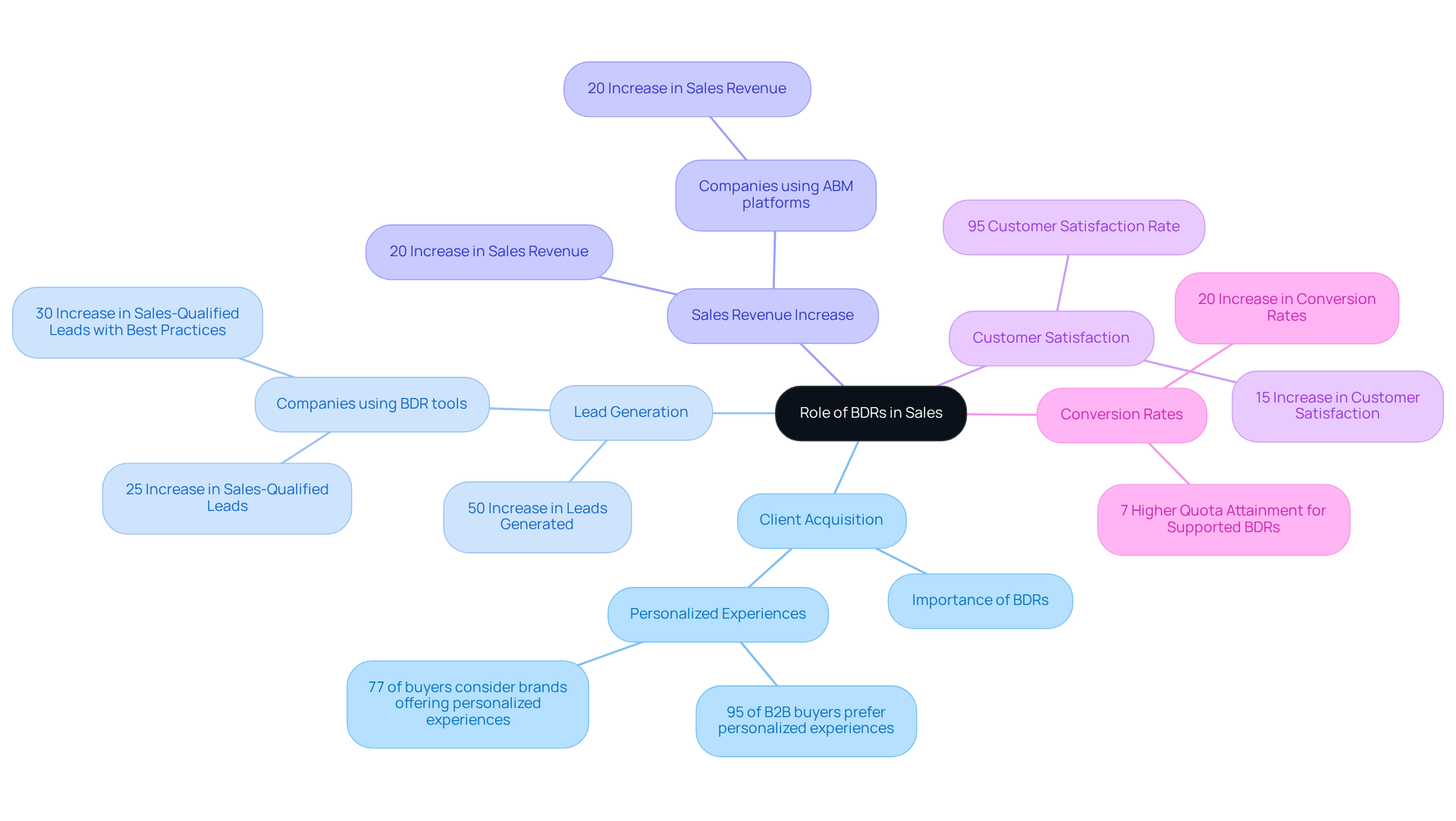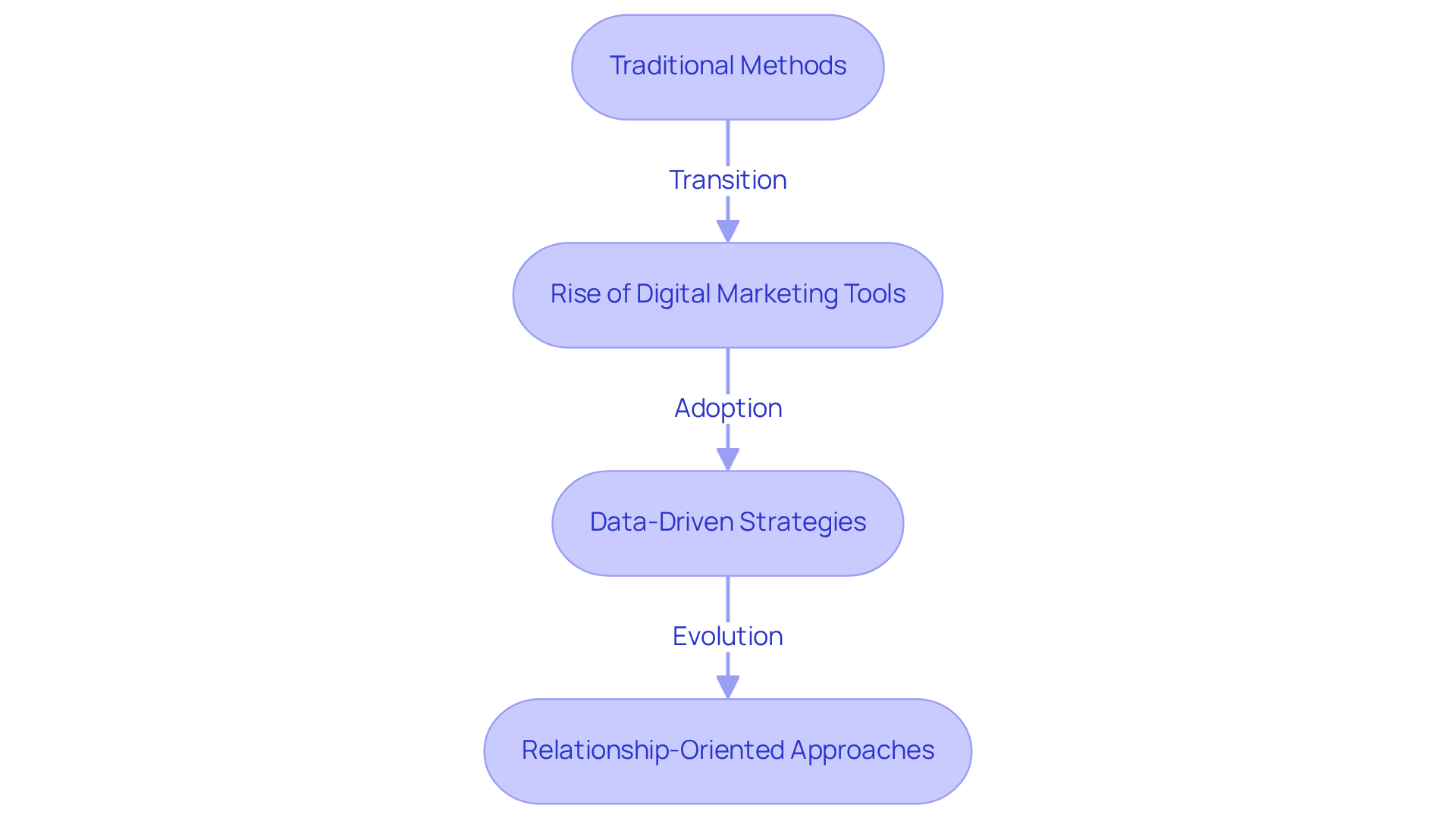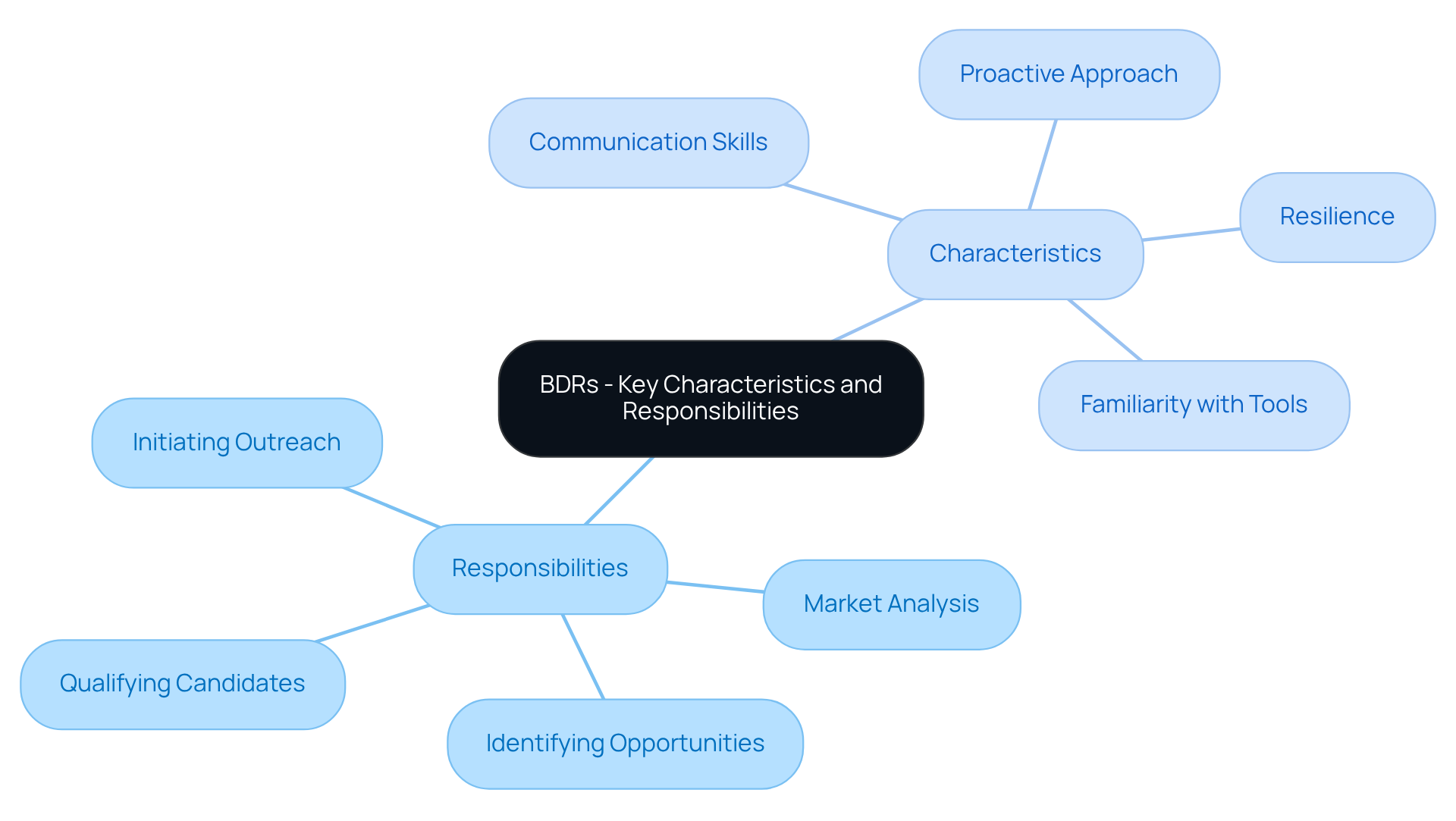Overview
The term BDR, or Business Development Representative, plays a vital role in nurturing new business opportunities. These dedicated individuals focus on identifying potential customers and initiating meaningful conversations to arrange meetings for the sales team. By engaging in outbound revenue initiatives, BDRs employ various outreach methods that help build a robust sales pipeline. This pipeline is not just a strategy; it’s essential for fostering business growth and enhancing efficiency in client acquisition.
We understand the challenges small business owners face in today’s competitive landscape. BDRs are here to alleviate some of that pressure by ensuring a steady flow of potential clients, allowing you to focus on what you do best. Imagine the peace of mind that comes from knowing there’s a dedicated effort to connect with prospects, paving the way for fruitful relationships.
In conclusion, embracing the role of a BDR in your business can be a transformative step. Together, we can achieve success by leveraging these professionals to drive your business forward. Are you ready to explore how a BDR can make a difference in your growth journey?
Introduction
Understanding the role of Business Development Representatives (BDRs) is vital in today’s competitive sales landscape. These dedicated professionals are the backbone of successful sales strategies, focusing on lead generation and client acquisition to foster business growth.
Yet, as the market evolves, many small business owners may find themselves asking: what does BDR truly mean for achieving sales success? This article explores the diverse responsibilities of BDRs, their significant impact on revenue generation, and how their role has transformed in response to technological advancements.
Together, we will uncover the key to unlocking sustained business success, ensuring you feel equipped to navigate these changes.
Define BDR: Understanding Business Development Representatives
A Business Development Representative (BDR), which is important to understand what does BDR mean, plays a vital role in creating new business opportunities and acts as a commercial expert dedicated to your success. This position involves recognizing potential customers, assessing opportunities, and initiating communication to set up meetings for the sales team. To grasp what does BDR mean, it's important to note that BDRs focus on outbound revenue initiatives, utilizing various outreach methods such as cold calling, emailing, and networking to build a robust sales pipeline.
Unlike Account Executives (AEs), who finalize deals, Business Development Representatives lay the groundwork for potential clients, which leads us to ask, what does BDR mean? They ensure a steady flow of prospects into the revenue pipeline, which is crucial for your business growth. We understand that navigating this process can be challenging, but having a dedicated BDR can make all the difference in establishing a strong foundation for your sales efforts. Together, we can achieve success by fostering relationships that lead to lasting business opportunities.

Contextualize the Role of BDRs in Sales and Client Acquisition
In the competitive sales environment, Business Development Representatives (BDRs) play a vital role in effective client acquisition, prompting many to ask, what does BDR mean? As the primary point of contact for prospective clients, BDRs are essential in building connections that can lead to long-term success. Their focus on lead generation allows companies to expand their customer base and increase market share, enabling teams to concentrate on closing deals rather than prospecting. This strategic division of labor significantly enhances overall efficiency.
For small enterprises, the benefits of utilizing business development representatives are especially evident. With limited resources available to support large sales teams, small businesses can truly benefit from the focused outreach and relationship-building skills that BDRs offer. Have you considered how this could impact your business? Research shows that companies using BDR prospecting tools experience a 20% increase in sales revenue and a 15% rise in customer satisfaction. Additionally, business development representatives contribute to higher conversion rates, with studies indicating that supported representatives achieve approximately 7% more of their quotas compared to their unsupported counterparts. In 2025, BDRs made an average of 21 attempts per contact, showcasing their persistence and dedication in outreach efforts.
Success stories abound, illustrating how small businesses have harnessed the power of BDRs for market expansion. For instance, companies adopting data-driven prospecting strategies often see significant increases in sales-qualified leads, with some reporting up to a 50% increase in leads generated. This not only improves the revenue pipeline but also promotes a more robust customer engagement strategy, ultimately leading to sustainable growth. As the market continues to evolve, expected to expand by 15% each year, small enterprises that prioritize the incorporation of business development representatives into their revenue approaches are likely to experience substantial advantages in both effectiveness and income. Together, we can achieve success by embracing these strategies.

Trace the Evolution of the BDR Role in Business Development
With the rise of digital marketing and sales automation tools, many are wondering what does BDR mean in the context of the remarkable transformation of the Business Development Representative role. Traditionally, BDRs relied heavily on cold calling and in-person networking to generate leads, prompting many to ask, what does bdr mean? However, as technology has advanced, the landscape has shifted dramatically. Today, BDRs harness a variety of digital marketing tools, including social media platforms, email marketing campaigns, and sophisticated CRM systems, which makes one wonder what does bdr mean in this context.
This evolution reflects a broader trend in sales, where data-driven strategies and personalized outreach are essential for success. Have you ever considered how companies using intent data analytics have reported a 62% increase in sales-qualified leads? This statistic showcases the power of targeted marketing efforts. Furthermore, an impressive 62% of business development representatives believe that AI enhances their productivity, allowing them to focus on high-potential opportunities rather than being bogged down by administrative tasks, which leads to the inquiry of what does bdr mean.
The incorporation of technology has not only simplified the prospecting process but has also empowered BDRs to analyze customer behavior and tailor their strategies accordingly. Tools like Wayy.ai provide daily email insights that track key metrics such as leads reached, interest shown, and conversion rates. This significantly enhances sales performance. Imagine connecting with prospects at just the right moment—this unique ability increases the chances of conversion. In fact, firms using revenue analytics tools have seen a 30% rise in finalized agreements, emphasizing the effectiveness of these contemporary strategies.
Expert opinions highlight that the evolution of BDRs in the digital era is not solely about using new tools; it’s about fostering connections through meaningful interactions. As Andrew Davis wisely states, 'Content builds relationships. Relationships are built on trust. Trust drives revenue.' This shift towards a more relationship-oriented approach, supported by technology like Wayy.ai, positions BDRs as vital contributors to driving sales success in today’s competitive landscape, leading us to consider what does bdr mean. Together, we can navigate these changes and achieve success in our business development efforts.

Identify Key Characteristics and Responsibilities of BDRs
Successful Business Development Representatives (BDRs) embody a unique blend of skills and characteristics, which raises the question: what does BDR mean for those who excel in their roles? Their primary responsibilities involve:
- Conducting thorough market analysis
- Identifying potential opportunities
- Qualifying candidates
- Initiating outreach initiatives
What does BDR mean in terms of what truly sets successful BDRs apart? Their exceptional communication skills, resilience, and proactive approach—qualities that are vital for navigating the challenges of prospect generation. They thrive on building relationships and understanding customer needs, which enables them to tailor their pitches effectively.
Familiarity with marketing tools and CRM software is essential for managing interactions and effectively handling leads. Training programs designed to enhance these skills can significantly elevate a BDR's effectiveness. Typically, onboarding takes around 90 days for internal teams, a period that underscores the importance of effective training. Notably, the average ramp time for a new representative is approximately 3.2 months, highlighting how crucial it is to invest in their development during this time. Ongoing learning and growth are vital, as 42.5% of new business development representatives take 10 months or longer to become effective.
Moreover, the typical tenure of a sales representative spans 1.5 years, leading to approximately 15 months of productive work. This emphasizes the necessity for organizations to invest in retaining talented BDRs, as understanding what does BDR mean is crucial. Given that hiring and working with internal SDRs can cost up to 2 million dollars, targeted training emerges as a crucial investment. By prioritizing these training programs, organizations can ensure their BDRs are well-equipped to contribute to the overall success of the sales team, ultimately driving revenue growth and nurturing long-term client relationships. Together, we can build a thriving sales environment that supports both employees and the organization as a whole.

Conclusion
Understanding the role of Business Development Representatives (BDRs) is essential for any organization striving to enhance its sales success. BDRs are the frontline warriors in the quest for new business opportunities, laying the groundwork necessary for a thriving sales pipeline. By focusing on lead generation and building relationships, they not only facilitate the sales process but also ensure that companies can scale effectively in competitive markets.
Throughout this article, we have highlighted the multifaceted responsibilities and characteristics that define successful BDRs. Their ability to conduct market analysis, identify potential clients, and initiate meaningful outreach is paramount. As we navigate the evolution of their role within digital marketing and sales automation, it becomes clear how crucial it is to adapt to new technologies and strategies. The statistics presented demonstrate how BDRs significantly contribute to increased sales revenue and improved customer satisfaction, showcasing their value in the overall sales strategy.
In light of these insights, it is evident that investing in BDRs is not merely a tactical decision but a strategic imperative for long-term business growth. We encourage organizations to prioritize training and development for their BDR teams, recognizing that these representatives are vital in establishing and nurturing client relationships. By embracing the evolving nature of the BDR role and leveraging their unique skills, businesses can position themselves for sustained success in an ever-changing marketplace. Together, we can achieve this success, and your commitment to investing in your BDRs will undoubtedly pay off.
Frequently Asked Questions
What is a Business Development Representative (BDR)?
A Business Development Representative (BDR) is a commercial expert responsible for creating new business opportunities by recognizing potential customers, assessing opportunities, and initiating communication to set up meetings for the sales team.
What are the main responsibilities of a BDR?
The main responsibilities of a BDR include identifying potential customers, assessing business opportunities, and using outreach methods such as cold calling, emailing, and networking to build a strong sales pipeline.
How do BDRs differ from Account Executives (AEs)?
BDRs focus on laying the groundwork for potential clients and generating leads, while Account Executives (AEs) are responsible for finalizing deals and closing sales.
Why are BDRs important for business growth?
BDRs ensure a steady flow of prospects into the revenue pipeline, which is crucial for business growth and establishing a strong foundation for sales efforts.
What outreach methods do BDRs use to connect with potential clients?
BDRs utilize various outreach methods including cold calling, emailing, and networking to engage with potential clients and generate leads.




